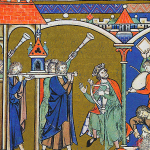“…The Chinese ideal was rule by virtuous men, not by law. The law was an instrument for officials to control the people, which is why some argue that benevolent authoritarianism is more natural to China than democracy, that Jiang Zemin is more ‘Chinese’ than ‘bourgeois liberals’ such as He [Qinglian] and [Martin] Lee.
“In fact, however, Chiense thinkers reflected on the rule of law and how to limit the power of rulers long before bourgeois liberalism or communism were even thought of. Huang Zongxi, a seventeenth-century scholar, wrote a famous treatise, entitled Waiting for the Dawn: A Plan for the Prince, that somewhat resembles Machiavelli, even in its title. But more to the point, Huang was wrestling with some of the very same issues that exercise liberals in China today. Once, he says, princes were unselfish guardians of the empire’s well-being, but that was long ago. Now, once a ruler had attained absolute power, ‘he clubbed and flayed the bones and marrow of the empire, and he scattered the sons and daughters of the empire, in order to provide for his own sensual pleasure. He deemed it natural, and said that this was the profit from his own business.’
“And here is Huang’s solution: ‘Should it be said that ‘there is only governance by men, not governance by law,’ my reply is that only if there is governance by law can there be governance by men. Since unlawful laws fetter man hand and foot, even a man capable of governing cannot overcome inhibiting restraints and suspicions.’
“By unlawful laws, Huang meant dynastic laws, which only served the interests of the imperial family. Rulers, in his view, should be subject to higher laws, devised by the ancient sages Confucius and Mencius and administered by learned mandarins. That Huang, a Han Chinese, resented being ruled by a dynasty of Manchus no doubt had something to do with this opinion, as did his desire to strengthen the position of scholar-officials like himself. But still, his ideas, which were to have a profound influence on the republican revolutionaries less than three hundred years later, illustrate that Chinese also understood how law could be the most effective tool to limit the inevitable excesses of absolute power.”
–Buruma, Bad Elements











